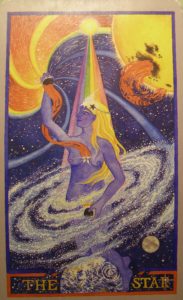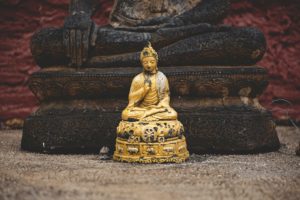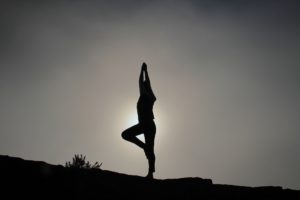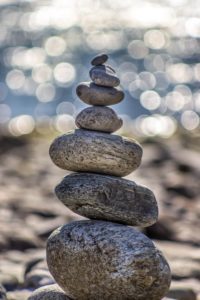by Jenny Rose | Mar 22, 2018 | Power
Resilience is “the capacity to recover quickly from difficulties.” (Oxford Dictionaries.) One of the most prevalent difficulties in modern life seems to be the ever-growing cacophony of Those Who Are Offended. I’ve been thinking about this for some time, but last week I read an interview with author Lionel Shriver that brought my own sense of offense to a head. Here’s a quote from that article:

Photo by Syd Wachs on Unsplash
“Shriver … is not the first to argue that the right to give offense is one of the very foundations of freedom of speech. ‘We’re moving in the direction of enshrining the right not to be offended, which is the end of liberty and certainly the end of good books.'”
Oxford Dictionaries defines offense in four ways:
- A breach of law or rule; an illegal act.
- A thing that constitutes a violation of what is judged to be right or natural.
- Annoyance or resentment brought about by a perceived insult to or disregard for oneself or one’s standards or principles.
- The action of attacking someone or something.

Photo by David Beale on Unsplash
The principle of free speech is taking a real battering in the United States. It’s a one-size-fits-all justification for whatever beliefs and ideologies we espouse. Freedom of speech, however, is not absolute. There are limitations around it intended to protect community and individual rights, including the “offense principle,” a restriction based on perceived offense to society. Freedom of speech is a principle that relies on social guidance, which is to say the intelligence and compassion of us, we the people.
This is a problem in a nation where compassion is daily more distorted and taken advantage of and critical thinking and civil discourse are increasingly difficult to come by. Who gets to define “perceived offense to society?”
Everywhere I look, listen and read, I observe people who appear to believe they have a right not to be offended. Freedom of speech grants such people the right to be offensive, as they’re quick to point out, but it’s only a one-way street. Offensive ideas and beliefs are becoming a broad category. Disagreement is offensive (and hateful and bigoted). Certain words, like ‘uterus’ are becoming offensive. Certain pronouns are offensive. Real or perceived exclusion is offensive. A perception of cultural appropriation is offensive. Identity politics of any sort are offensive. Science and evidence-based thinking are offensive. Name any religion or spiritual framework you like — it’s offensive.
When did we become so precious, infantile and entitled that we stopped dealing effectively with being offended?
When did the cancer of selfishness destroy our willingness to consider the needs of those around us?
When were individual distorted perceptions given power over a larger, more common good?
When did disagreement, questions and citing scientific data begin to earn death threats?
Our social, cultural and political landscape is enormously complex, at least at first glance. We’ve become fantastically and gleefully skilled at silencing, deplatforming, invalidating, gaslighting, projection and the fine art of withering contempt. We suffer from an epidemic of what I call Snow White Syndrome. Remember the wretched queen stepmother and her mirror? “Me, me, ME, not you! I’m the fairest, I’m the best, I’m the most victimized, I’m the most downtrodden, I’m the richest, I’m the most offended!”
At first glance, as I said, it’s all so complex. At second glance, it’s all distraction and bullshit. The bottom line is always a power dynamic. Is an individual or group requesting or demanding power-with or power-over?
It really is that simple.
I’m offended every single day. School shooters offend me. Tantruming and pouting politicians offend me. Silencing tactics offend me. Being forced to deal with the sexual fetishes of others offends me. The list goes on and on. You know who’s responsible for dealing with all this offense?
Me.
It’s not your responsibility to refrain from offending me, and it’s not my business to tippy-toe around your delicate sensibilities, either. Many of us try to approach others with kindness and courtesy, but that doesn’t mean we’ll receive either in return. I don’t expect the world to accommodate me. Life is not fair. Equality is an ideal rather than a reality. Inclusivity is not a right.
My rights and needs are as important, but not more important than anyone else’s.

Photo by James Pond on Unsplash
Individuals and groups who lobby to take away the rights of others work from a power-over position. They’re weak and fearful and use violence and intimidation to distract others from their impotence. Individuals and groups who lobby to create more equal power dynamics work from a power-with position. They’re confident and seek authentic connection through information sharing and constructive contribution toward the well-being of all.
Resilience, not priggish rigidity or sheep-like agreement with the prevailing social fashion, always wins the evolutionary jackpot. Resilient life flexes and bends, masters new environments, learns and successfully reproduces, continues. Life that doesn’t dies. Evolution is not personal. It makes no distinctions between a human being and a cockroach. Evolution has a lot of time, millions upon millions of years. The ebb and flow of species on earth is nothing but ripples. Patiently, intelligently, life begins again, over and over, building its complex web.

Photo by Biel Morro on Unsplash
If we can’t figure out how to live in harmony with our bodies, our communities and the earth, we will be deselected. Walking around with a mouth like a pig’s bottom because we’re offended, mutilating and poisoning our bodies, creating sexual pathology that interferes with our ability to reproduce our DNA, wasting our time and energy engaging in idiotic arguments and eradicating education and critical thinking will all lead to deselection, and it should. Such a species is more destructive than constructive to all the other forms of life on this planet.
Difficulties of all kinds are a given. They always have been. Difficulties are the pressures that shape us and make us stronger — or deselect us. If we want to survive, we need to put aside our offended sensibilities and concentrate on the things that contribute to the stuff of life: food, water, shelter, connection, raising healthy children, our physical and mental health and the well-being of Planet Earth. It seems to me that’s enough to be going on with. If we can’t begin to achieve resilience, the debate over who gets to use which bathroom becomes as moot as it is ridiculous.
Resilience can be learned. We foster it by letting go, learning to be wrong, exercising our intelligence, and forming healthy connections so we can learn from one another, figure out how to share power and support one another. Life was never advertised as a free ride. The privilege of life comes with responsibility, demands and competition. Taking offense is not a life skill. Malignant destruction of life, either our own or somebody else’s, is not a life skill. Taking our proper place in the food web and the natural cycles of life and death, on the other hand, is essential if we expect to continue as a species.
Life, in the end, is for those sensible enough to live it, and part of surviving and thriving is resilience. Maybe, if we can get a grip and refocus on what matters, we can learn from the cockroaches, viruses, bacteria, mice, flies, ants, crows, soil organisms and many others that have figured out how to adapt and evolve through every difficulty they encounter.
Offended? Get over it.

Photo by Jonathan Simcoe on Unsplash
All content on this site ©2018
Jennifer Rose
except where otherwise noted
by Jenny Rose | Mar 1, 2018 | A Flourishing Woman, Creativity
Alchemy: A seemingly magical process of transformation, creation, or combination (online Oxford Dictionaries).

The Star
Emotional intelligence training opened my eyes to the power of needs in our human experience. Coming to terms with my own needs catapulted me into a new life. During the months in which I learned to navigate through my feelings, needs (click here for needs inventories), limiting beliefs and stories, I kept coming back around to the same question.
If I accept that all human beings have needs, and a right to have them met, what then do I do with my unmet needs, past and present?
We might all have a right to get our needs met, but that doesn’t mean we have a guarantee they will be met, or that we can hold anyone responsible for meeting them. We can meet some of our own needs, but not every one. Some needs require healthy connections with others, but not everyone has that. Some people don’t have a single healthy connection with another human being, let alone many, and one relationship can’t meet all our needs.
Unmet needs are devastating, make no mistake. They drive addiction, all kinds of violence and power-over behavior (like school shootings), mental and physical disease and illness, and suicide. A chronically unmet need is a nonhealing, stinking ulcer on the soul. We may hide it from others and even ourselves, but it never stops oozing blood and pus. Unmet needs can cripple and/or kill us. We can let go of some people, behavior and beliefs, but needs are intrinsic.
None of us can entirely meet another’s needs. We all have limitations of some kind, and finite resources of time and energy. Being unable to meet another’s needs is not necessarily because we’re unloving or uncaring. Most of our close relationships probably do meet some of our needs some of the time, and we meet some of their needs some of the time. It’s not black or white. It’s a continuum, a balance of reciprocity.
So, I ask again, what about our needs that just don’t get met because even our healthy connections are unable to fill them?
At that point we make choices. We can choose to:
- Act out in some desperate, destructive or deadly way that hurts ourselves or others.
- Blame the people around us for failing to meet our needs.
- Blame ourselves for having needs and feeling the pain of having them unmet.
- Deny that we need anything from anyone — ever (my personal favorite).
- Figure out how to neutralize the experience of unmet needs.
By neutralize, I mean accept and surrender to how painful it is to carry around a bone-deep, persistent longing for something that’s unavailable.
Acting out has never been my style. I’m also not much interested in blaming others for what goes wrong in my life. It feels like a cop-out and it disempowers me. Blaming myself — now that I’m very good at. I’ve spent years perfecting the art of self-loathing, but it’s never been helpful. Not even one time. Besides that, it hurts. I can’t pull off denial, at least not for long. I might refuse to admit certain things to someone else, but I don’t play games like that in the privacy of my own head. I have a file in my documents labeled ‘Denial File.’ Now and then I put something in that file and leave it there while I wrestle with my unwillingness to believe. When I’m ready to stop arguing with what is, I take it out and re-file it. Usually, the Denial File is empty, but I like knowing it’s there for the really tough information.
That brings me to the last choice, which leaves me standing squarely in my power. I don’t hurt myself, I don’t hurt anyone else and I get to think outside of the box — my favorite thing! What kind of alchemy transforms, creates or combines an unmet need into something beautiful?
For several months I’ve been researching outer space for my second book. I’ve compiled lists of constellations and the mythology around them. I have definitions of meteors, comets and nebulae. I’ve spent hours looking at images from space. Astounding, mysterious, vast and lovely, the universe is infinitely larger than the largest playing field I can imagine. I gulp down science fiction books and I’ve watched hours and days and weeks of Star Trek, Stargate, Battlestar Galactica, Firefly and yes, yes, Star Wars!
I also, fairly frequently, turn up The Star card when I work with my Tarot deck. The Star symbolizes creative powers, confidence and diversity.
So, what if I create a cosmos? Great word, cosmos. It means “the universe seen as a well-ordered whole” (online Oxford Dictionaries). I’m always in favor of well-ordered, especially when I get to define it. All the pieces of my experience, including unmet needs, are part of a whole. I prefer combination and integration to amputation.

Photo by NASA on Unsplash
Here I am, with my unmet needs, my history, the people who have been significant in my life and a lot of passionate feelings to express and process. I’m an alchemist, a creator, and before me is a vast black nothingness.
I want stars in my cosmos, so every tear I’ve ever cried becomes a star. I fling them far and wide, like handfuls of tiny crystals. My cosmos is so vast there’s always room for more.
I want planets in my cosmos. I hang them carefully, one by one. These are the people in my life, past and present, living and dead. Some are hot planets, sere and lifeless. Others are cool and green and blue. Every cosmos needs a bloviating, bullying gas giant with heavy gravity that sucks more than its fair share of, well, everything! Rings are decorative, and spots and alien seas and strangely-shaped continents. Also, sand dunes and storms, poisonous (to us) gases, radiation, erupting volcanoes, mountain ranges and glaciers.

Photo by NASA on Unsplash
How about moons? Cool and sterile or lush and verdant; I definitely want moons. I want constellations, too, and stories to go with them. Blazing meteors and trailing comets add movement. Nebulae add color and mystery. Galaxies swirl and spiral or spill like ribbons of milk against the darkness. Black holes suck. Suns supernova.
One by one, I use my unmet needs to decorate my cosmos. I turn them into color, texture, pattern, alien world, moon, star, sun, comet, meteor and nebula. I name them, animate them with feeling, polish them like jewels and set them in place. Maybe they stay in the farthest reaches of my cosmos, where I rarely visit them, or maybe I keep them closer. Perhaps my unmet needs appear from time to time in a meteor shower or a comet with a long tail, and I marvel at their beauty and mystery and remember again their taste and feel before they burn away to ash or disappear behind a planet.

Photo by Bryan Goff on Unsplash
My cosmos is my laboratory and my kitchen, illuminated by starlight. I stir and simmer over the heat of suns; chop and mix under waxing and waning moons; grind alien insects, rocks and roots for pigment and infuse gas and cosmic dust with color. I orbit, I dance from galaxy to galaxy in bare feet, combine a pinch of this with a handful of that until I float, weightless and free, in a cosmos of my own design and decoration.
Whenever the world is too much with me and I find myself staggering under burdens of unmet needs and other things I cannot release, I unlock a hidden door with the key I carry between my breasts and find star candles lit, suns asimmer, planets revolving and black holes lurking. Mortar and pestle, cauldron and crucible wait for my magical offerings as I combine, create and transform the material of my life into a complex and resplendent whole.
Alchemy. My daily crime.

Photo by Bryan Goff on Unsplash
All content on this site ©2018
Jennifer Rose
except where otherwise noted
by Jenny Rose | Jan 11, 2018 | Connection & Community, Emotional Intelligence
In life coaching, I was introduced to the idea that human beings have three primary needs: Connection, contribution and authenticity. I have yet to discover a need that doesn’t fall into one of these categories, so at this point it’s still a frame that works for me.

Photo by Peter Hershey on Unsplash
For me, any discussion of connection must include spiritual connection, and to talk about that clearly I need to define terms.
Spirit: The nonphysical part of a person that is the seat of emotions and character; the soul.
Religion: The belief in and worship of a superhuman controlling power, especially a personal God or gods.
Faith: Strong belief in God or in the doctrines of a religion, based on spiritual apprehension rather than proof.
Ideology: The ideas and manner of thinking characteristic of a group, social class, or individual.
Sacred: Connected with God (or the gods) or dedicated to a religious purpose and so deserving veneration.
(All definitions from Bing search.)
Spirituality: Spirituality may refer to almost any kind of meaningful activity, especially a “search for the sacred.” It may also refer to personal growth, blissful experience, or an encounter with one’s own “inner dimension.” (Wikipedia)
The archeological record tells us we have sought to understand ourselves as part of a greater whole from the infancy of mankind. Long before written records were made, there was cave art, pottery and carving thought to represent sacred beings, including, in many cases, animals. When we began to write, myth, story and legend wove a rich tapestry of religion and other spiritual frameworks all over the world.
Our powerful need for spiritual connection has historically been a significant motivator geopolitically, economically and creatively. Our search for understanding who we are and what our place in life is, individually, culturally, politically and socially, firmly anchored in our conception of spirit.
How do we create a spiritual connection? How do we choose from such a bewildering array of beliefs and ideologies? How do we cope with tribal shaming if we don’t accept the spiritual beliefs of our family or tribe? How do we think about the “nonphysical part” of ourselves, and what, if anything, does that part of us need?
It’s taken me more than 50 years to even begin to answer these questions. The two biggest obstacles I had to overcome were disconnection from my own feelings, and denying having any needs. Disconnection and denial are both disempowering, and healthy spiritual practice, at its heart, is a practice of self-empowerment.
Some people approach formal, organized religion as a way to share power. Others are quick to use it to assure power over others, and at that point it no longer fits my definition of a healthy spiritual practice. Discovering and nurturing the shape of our own spirit is an act of dignity, privacy and self-respect. It has nothing to do with what anyone else thinks or believes. We decide where we stand on the continuum between science and faith, and we define what is sacred in our lives. We have the power, and we have the responsibility. No mystic, guru, psychic, yogi, mentor, sponsor or other spiritual or religious leader or authority knows what we need better than we do. We owe nobody an explanation, justification or apology for our spiritual practice, as long as that practice doesn’t seek to harm or control others.
That’s not to say the guidance, teachings and wisdom of scholars, practitioners, philosophers, masters and thinkers are without value or interest. Yoga, martial arts, meditation, mandalas, drumming, dance, sacred traditional music and countless other rituals and traditions may be part of a spiritual practice, but none of these are essential. The real strength of spiritual practice doesn’t lie in appearance, embellishments, publicity or visibility and has nothing to do with economic or social condition.
A spiritual practice is an activity in which we are wholly present with ourselves in a nonjudgmental fashion and after which we feel empowered, anchored, refreshed and renewed. A healthy spiritual practice is a haven, a refuge, a place of solace and joy. It connects us to ourselves, to others, and to something larger than we are. It doesn’t matter if we name that something God, Allah, Spirit, Divine, Goddess or even Gaia, it all boils down to the basic human need for some kind of spiritual connection.
A few weeks ago I wrote about living a seamless life. My spiritual practices are frequently invisibly embedded throughout my every day life, requiring nothing more than my presence and intention.
Here’s an example: After a long day the kitchen is full of dirty dishes. I slather my hands with the most luxurious lotion/cream in the house and don rubber gloves. I turn off lights, tech and the TV. I light a couple of candles. I might play some music, or just soak up silence. I look out the window over the sink. I breathe. I relax. I’m present. I’m consciously grateful for a kitchen, dishes, a sink, running hot water, the ability to stand and use my hands, and food that creates dirty dishes. I take time to feel what I feel, check in with myself, daydream and drift.
I approach exercise as a spiritual practice. I’m not worried about my weight or health, but I do notice I feel better, sleep better and function better if I stay active, so my daily goal is to show up at some point with myself to move. Sometimes I dance. Once a week I swim, then soak in a therapy pool, then take a long hot shower. I walk, both by myself and with my partner. This winter I’m going to begin snowshoeing. I do Tai Chi. With the exception of walking with my partner, all of these activities are opportunities to have time with myself, quiet, undistracted time in which to be in my body, remember what a beautiful world I live in, practice gratitude, allow feelings, pray, chant, sing, work creatively, stretch and breathe. When I’m finished I feel relaxed, empowered, centered and grounded.

Photo by Miranda Wipperfurth on Unsplash
A spiritual practice may be as simple as a special tree, rock, crystal, cushion and/or candle. It might be a secret altar or shrine, a string of beads or a stick of incense. It can take place anytime, anywhere, solo or in a group. It can be a five-minute pause or a long weekend of ritual at a hot spring, but it always makes us bigger. Anything that diminishes, restricts, confines, limits, shames, invalidates or disempowers us is not a healthy spiritual practice, no matter what anyone says. It’s merely an ideology of control.
Many of us naturally find our way into spiritual practice without realizing what we’re doing, impelled by this often unconscious but powerful human need. Recognizing the need for spiritual connection, giving it language, honoring and allowing it, allows us to take back our power to define and protect sacred space in our lives, free from distraction, interruption, multitasking, pressure, hurry and the constant noisy static of media and entertainment. If our spiritual life is tainted by criticism and judgement, our own or others’, it won’t sustain us and our spirit will sicken and starve. We’ll begin to look outside ourselves for spiritual nourishment and become vulnerable to addiction, perfectionism, pleasing others and people who steal power.
The care and feeding of the spirit is the least talked about aspect of the need for connection, but it may be the most important. In the absence of spiritual connection, all our other connections suffer. True spiritual power transcends physical strength, youth and beauty, and it cannot be coerced or stolen. Our greatest strength may lie in our ability to create spiritual connection for ourselves and support others in theirs.

Photo by Deniz Altindas on Unsplash
All content on this site ©2018
Jennifer Rose
except where otherwise noted
by Jenny Rose | Dec 8, 2016 | Power
I’m thinking about money today. This is not new. Sometimes I think most of my life has been consumed by thoughts about money. Well, not thoughts so much as panic, guilt, shame and worry.

Photo by Teddy Kelley on Unsplash
There’s a heavy snowstorm here in central Maine. I’ve just been standing looking out my attic window, watching it fall on the huge elderly maples, bare as old bones, and the grass and the street and our little black Hyundai car in the driveway.
We found out this morning the car needs about $1,300 worth of work. Almost exactly what it’s worth. Time to make choices.
We went out to walk, my partner and I. I didn’t cover my head, and when we got home my hair and eyelashes were clotted with wet snow. My son, who had gone out to run errands, was backing into the driveway as we came home. He’d been meditating in a ditch, not being able to get in touch with us, after sliding off the extremely slick road and into a guy wire securing a telephone pole. Some kind soul drove by and pulled him back onto the road. Fortunately, my son wasn’t dented, but the car was. This, needless to say, does not improve the resale value!

Photo by Caley Dimmock on Unsplash
I also took time this morning to buy Christmas gifts, so I’ve been absorbing all the jingle bells, merry merry and buy buy online. Quite a contrast, all the glitz and glitter, deals and special buys and impossibly joyous advertising, to the silent world outside the window, grey, smoke blue, brown, dark green and the ivory snow. Over the years, I’ve done less and less gift exchange for Christmas. There are only two people left with whom I do it, not because I don’t love giving gifts but because of financial stress and my resentment of the pressure to consume.
I’ve always had a dreadful relationship with money. My earliest understanding of what it was became inextricably tangled with anguish, fear, rage and power issues. As a child, I was always afraid there wouldn’t be enough. As an adult, I was locked in a belief that money defined me. To have money was to be successful, and to not have it was to be a failure. There was a well-known and well-defined path to follow: Graduate high school with top grades and scholarships, obtain a college education in something employable and lucrative, get a job with benefits, and never NEVER touch the principal. If you must borrow, pay off ASAP and stay out of credit debt. Save for retirement, own your own home and pay off the mortgage, take vacations and have a nice car.
However, during my lifetime the world has changed considerably. The middle class from which I came has all but vanished. I didn’t want to go to college, but did it because it was expected. I didn’t get a good scholarship and felt guilty every day I was there, and my guilt was made worse by the fact that the only subjects interesting me were religion, literature, history and the like. After two years, I dropped out. (Note: Dropouts are NOT successful. Ever.) I’ve been working ever since.
Then I got divorced (credit card debt), saved for retirement but cashed a couple of those accounts for emergencies, lost all my investment money to a crooked contractor, never took a vacation or even a plane ride out of my own pocket, and never in my life bought a new car. Retirement? You must be kidding. What are the chances there will even still be social security by the time I’m 65?
This is in no way a remarkable biography, I realize, but for me there’s a red stamp across every page of it that says FAILURE.
I’ve only in the last two years really understood how much power I gave money to define who I am and what I’m (you guessed it) worth. The idea of monetary value, like sexism, is embedded in our very language. There’s no escaping it. In my culture, the failure to make and spend money in ever increasing amounts is unpatriotic, unattractive, unsuccessful and sometimes illegal.
This is all wrong. I feel like the little boy who said out loud the emperor had no clothes. Everyone was appalled and shushed him, lest the emperor hear and be offended.
I know myself to be an intelligent, heartful, creative, empathetic, honest person. The numbers in my bank account have absolutely nothing to do with those qualities.
The most important things in my life are my healthy relationships. Again, the numbers in my bank account have no influence over my ability to love and be loved and connected. (Hint: A relationship dependent on money doesn’t fit my definition of healthy. Just sayin’.)

Photo by Senjuti Kundu on Unsplash
My ability to be present, entertain joy, laugh, create and learn has nothing to do with money.
My enormous talent for life has nothing to do with money.
Unfortunately, our broken system does require money for health care and the necessities of shelter, food and water. To be human is to need these basics. Not having money for them is the experience of increasing numbers of Americans and the vast majority of others in the world. I myself don’t have the money to buy health insurance. Does that mean we’re all failures?
Of course not.
Not only that, but we’re exhausting our global resources and when no amount of money will buy food and water we’ll all starve together, regardless of our bank balances.
So, yeah, we’re going to have to figure out what to do with the car. We’ll have to get a loan and work on finding a good used vehicle that can deal with our weather. It will mean a monthly car payment. No idea how we’ll do it, but I know we’ll find a way. Before that, we may have to do some work on the Hyundai in order to get top price for it.
But none of that is about me, or what I’m worth in the world, or what I can do or be. It’s all just static and distraction. It’s not failure or success, it’s just that cars age out and need to be replaced. If I could go out and buy a brand-new Subaru, it wouldn’t be failure or success, either. It would be CONVENIENT and LUCKY.
Here are a couple of Christmas presents from me to you. The first is a quote and the second is an old wisdom tale from the Hindu tradition, one version of which is in More Ready-To-Tell Tales from Around the World, edited by David Holt and Bill Mooney, and told by Jim May.
“It is no measure of health to be well adjusted to a profoundly sick society.”
–Jiddu Krishnamurti
The Ruby
A holy man awoke, as usual, in the hour before dawn, on his mattress of grass. A warm wind moved across the land, bringing the scent of dust, animals, early morning cooking fires and blossoms, fresh and sweet in the cool morning.
The holy man was beginning his morning prayers when an excited young peasant ran up to him. “Master, where is it?”
The holy man raised an inquiring eyebrow.
“I had a dream,” said the peasant, calming himself. “In my dream, I met a holy man at the edge of the village. And here you are! The holy man gave me a precious jewel.”
“Ah, yes,” said the holy man. He bent and pulled from beneath his mattress of grass a ruby the size of his fist. “You must mean this. I have no use for it.”
He handed it to the peasant, who had never held more than two copper coins in his hand. The peasant raised the ruby between himself and the rising sun and his awed face was washed in red shadow. He walked slowly home, his eyes fastened on the ruby. He entered his simple hut and sat down on the dirt floor with the ruby before him.
All day he gazed, enchanted, and dreamed of what the ruby could buy him. He forgot his morning prayers. He didn’t eat, bathe, or take care of his livestock. He didn’t scythe grass for hay. When night came, he didn’t say his evening prayers, make a meal or lie down and rest. He sat before the ruby, worshipping.
The next morning the peasant took the ruby in his hand and went out, searching the fields for the holy man. When he found him, he handed the ruby back to him.
“This is not the precious jewel I want. Teach me what you know that made it so easy for you to give it away.”
All content on this site ©2016
Jennifer Rose
except where otherwise noted
by Jenny Rose | Nov 10, 2016 | Connection & Community, Emotional Intelligence, Shadows

Photo by David Beale on Unsplash
My partner sent me this quote this morning, and inspired this week’s post.
“Being able to feel safe with other people is probably the single most important aspect of mental health; safe connections are fundamental to meaningful and satisfying lives. Social support is not the same as merely being in the presence of others. The critical issue is reciprocity: being truly heard and seen by the people around us, feeling that we are held in someone else’s mind and heart. For our physiology to calm down, heal, and grow we need a visceral feeling of safety.”
— from p. 79 in The Body Keeps the Score by Bessel van der Kolk
As I draft this, it’s Election Day. It’s a work day for me, but I have a long break between a morning and evening shift, so I voted, ate lunch and worked on a big clean-up project my partner and I are undertaking in an outbuilding on our place. The clean-up involves dust, dirt, trash, food debris, rodent and bat droppings, broken glass, sticky empty bottles and cans and cigarette butts. It’s filthy work, but this afternoon, forty-five minutes before I go back to my pay-the-bills job, I feel happier and more peaceful than I have all summer.
I feel safe.
My earliest memories are of feeling unsafe. The people around me were unhappy and unwell. The air was heavy with tension and unexpressed feelings. I was afraid all the time, and I knew that was bad, because it irritated the adults, so I tried to hide it. The world was unpredictable, inconsistent and baffling. Ever since those days I’ve comforted myself in times of stress and fear with a fantasy of being held in loving, protecting arms and feeling safe.

Photo by Jordan Whitt on Unsplash
I’ve been ashamed of that need. If I verbalize such a need, people will hasten to assure me that life isn’t safe, as though I haven’t figured that out, as though that wasn’t the point in the first place! An internal, jeering voice calls me a baby; a weak, pathetic thing, dependent and needy.
Yet safety is the most important thing to me in relationship, and healthy relationship is the most important thing to me in life. I want it more than I want money, more than I want a dream house, more than I want anything I could buy. At this point in my life, I’d much rather be alone than be in relationships that don’t feel safe.
I suppose safety is a term we each define differently, but I know what I mean by it. I mean knowing my thoughts, needs and feelings count. I don’t want to be the most important person in the picture, but I want to be as important as everyone else.
One of the things I need to feel safe is an orderly and predictable environment. That’s why raking up trash, sweeping, packing the car with bottles and cans and watching the man in the bottle shop count them is so satisfying. Creating order out of chaos stops my bleeding. Empty space, a clean dirt floor with the drag marks of the rake in it, allowing the dusty scent of old wood and fallen leaves to replace the smell of stale cigarettes and beer, are all calming. The energy of broken glass and animal-torn trash, the debris of self-destruction, is released. I can breathe again. There’s peace. I’m safe.
I’ve seen a lot of headlines about the national stress around this election. Political opinion and affiliation aside, I think most of us can agree we’ll be relieved to have it over. At this point it’s hard for me to even care who wins — I just want the hate and intolerance to end. It hurts me to see us tear ourselves apart, as friends and families, as communities, as a nation, as a globe. It creates no safety for anyone. We’re all vulnerable to hate.
This afternoon, breaking down cardboard and recycling bottle caps, I knew that part of my feeling of relief is that this election is over today. Whatever happens now will happen, and we’ll all have to go forward. Likely what’s ahead won’t feel any safer than what’s behind, but at least it’s movement away from this.
I wish I could take the last year of presidential campaigning and empty out the dregs of malodorous advertising and sound bites, sort out the ridiculous from the frightening and bag each speech, event and word. I wish I could sweep our memories clean of it, pick up the shattered broken glass of integrity; rake up all the greasy, moldy, broken egg shell stinking scandals and e-mails and recordings.
I wish America felt safe to me.
I wish Democracy felt safe to me.
The Morning After
As I sit down to finish this post, American voters have chosen a new president, and I wept as I ate breakfast with my partner.
As the day has passed and I’ve gone for a swim, taken myself to lunch and gotten a haircut, I realize what lies beneath my anger, despair and incredulous disbelief.
It’s right back to the beginning of this post. I’m afraid. I don’t feel safe. Overnight I seem to have become disenfranchised because I’m female, I’m not a Christian and I’m deeply concerned with human rights and freedoms and our planet.
I also realize I’m not alone. This election has been based in fear. In our fear, we’re truly united. Everyone fears something. We’re all looking for safe, strong arms to shelter in. Pick any campaign issue, and you’ll find fear. There’s fear of climate change, fear of economic collapse, fear of immigrants and shifting population demographics, fear of war, religious fear, fear of illness and disease. We all live in fear that someone or something will take our power away, and that fear makes us weak and vicious.
Fear breeds hatred. Racism, misogyny, censorship and terrorism are fear-based behaviors, Great-and-Powerful-Oz distractions that hide cowardice. The world is changing, and we’re terrified. We look for someone or something to blame. We look for someone or something to save us. In our fear, we cling desperately to our ideologies and annihilate any who disagree with us or question our beliefs. In our fear, we seek a hero/heroine, a representative of what we feel is just and right, someone who will help us retain our power, someone who will assure us there are no monsters under the bed.
Here’s what I believe: Power-over is always and inevitably doomed to fail, sooner or later. The only sustainable way forward is power-with one another.
None of us are safe until all of us are. Safety at the expense of another’s terror and repression is an illusion.
I pray for peace and unity for us in the coming days, months and years, but if that is not to be I will fight. Every Hitler and Pol Pot, every Sauron and Voldemort, create by their very existence heroic resistance that cannot be silenced. I will not turn against my friends, neighbors, families and communities in fear and do the bully’s work for him. I’ll work to undermine the bully himself, and I won’t stand alone.

Photo by Tim Gouw on Unsplash
Has anyone read the book I quoted at the beginning of this blog? Please comment about it if you have. I’m adding it to my reading list.
All content on this site ©2016
Jennifer Rose
except where otherwise noted


















